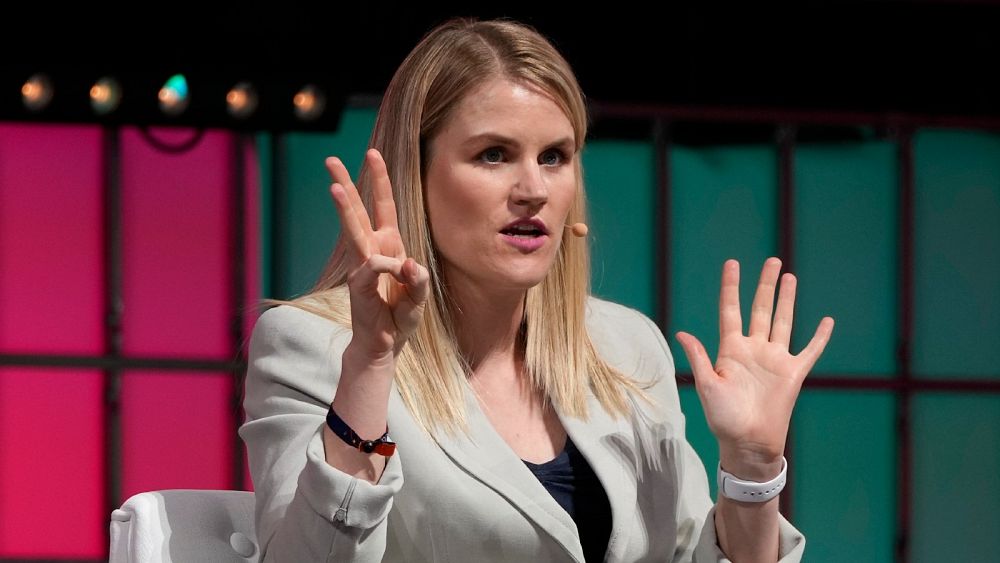
Frances Haugen, the Facebook whistleblower who has exposed the company’s alleged inaction to fight misinformation and hate speech, is in Brussels to discuss content moderation, online safety and fundamental rights with MEPs.
The hearing — which you can watch live on this page from 16.45 CET — is expected to strengthen the EU’s push to pass unprecedented legislation that would impose a clear set of rules and obligations on the largest tech companies.
Haugen rose to global prominence in early October when she appeared on a prime-time show on American television and claimed Facebook consistently chooses to prioritise its profitability and growth to the detriment of the well-being of its millions of users around the world.
Haugen, who worked in the company’s civic integrity department, leaked hundreds of documents to The Wall Street Journal and the Securities and Exchange Commission to back up her claims.
The data engineer has accused Facebook of fostering a business model that promotes hate speech and misinformation, damages democracy and sows social division through the uncontrolled spread of polarising — but highly profitable — content.
She has spoken about Instagram’s negative impact on teenage mental health and Facebook’s enabling role in the ethnic violence in Ethiopia and Myanmar. She also said the tech giant misled investors by supposedly painting a deceptive picture of its efforts to curb misinformation. More recently, she called on the founder and CEO Mark Zuckerberg to resign.
“The thing I saw over and over again was that there were conflicts of interest between what was good for the public and what was good for Facebook,” Haugen told CBS’s 60 Minutes.
Facebook has denied all accusations and argues Haugen is offering a false and nonsensical description of how the company works. In the midst of the scandal, the group decided to rebrand itself as Meta.
Haugen’s visit to Brussels is part of a European tour that began in the United Kingdom and then continued in Germany.
MEPs want to use her insider perspective to feed into the ongoing negotiations around the Digital Services Act (DSA), a world-first draft law to govern the digital economy.
Unveiled in December 2020 by the European Commission, the DSA is a rulebook to protect the fundamental rights of consumers and increase the transparency and accountability of online platforms.
The legislation features a set of obligations for Internet providers, hosting services (like cloud), online platforms (such as app stores and social media) and the so-called “very large online platforms”, those who reach more than 10% of the EU’s population. Facebook has over 250 million users in the bloc.
Due to its size, audience and profits, this last category is the one subject to the longest list of rules and obligations, which include abiding by codes of conduct, sharing data with public authorities, disclosing algorithms used for recommendations and empowering users to report illegal content.
The introduction of the DSA, together with its twin sister law the Digital Markets Services (DMA), has sparked a flurry of lobbying from Big Tech firms, which are determined to influence the EU’s regulatory efforts before they become the de facto global standard, as happened in 2018 when the General Data Protection Regulation (GDPR) entered into force.
“First of all, I think all users of Facebook should know and understand to the greatest extent the business model and the choices behind the operation of the platform,” said Christel Schaldemose, the Danish MEP acting as rapporteur for the DSA file.
“Secondly these revelations will impact the DSA and thus European users of Facebook and other platforms in the near future.”
Before the parliamentary hearing, Haugen met with Schaldemose and Thierry Breton, the European Commissioner for the internal market.
Both the DSA and DMA are being debated and negotiated separately by the European Parliament and the Council, which gathers the 27 member states. The final legislative versions are expected to pass in the second half of 2022, although the process could be prolonged if the two institutions fail to reach a consensus.